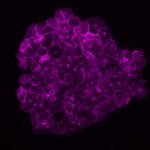Link to Pubmed [PMID] – 27568570
Link to DOI – S2211-1247(16)31031-210.1016/j.celrep.2016.08.001
Cell Rep 2016 09; 16(10): 2539-2545
Manipulation of the master regulator of energy homeostasis AMP-activated protein kinase (AMPK) activity is a strategy used by many intracellular pathogens for successful replication. Infection by most pathogens leads to an activation of host AMPK activity due to the energetic demands placed on the infected cell. Here, we demonstrate that the opposite is observed in cells infected with rodent malaria parasites. Indeed, AMPK activity upon the infection of hepatic cells is suppressed and dispensable for successful infection. By contrast, an overactive AMPK is deleterious to intracellular growth and replication of different Plasmodium spp., including the human malaria parasite, P. falciparum. The negative impact of host AMPK activity on infection was further confirmed in mice under conditions that activate its function. Overall, this work establishes the role of host AMPK signaling as a suppressive pathway of Plasmodium hepatic infection and as a potential target for host-based antimalarial interventions.


